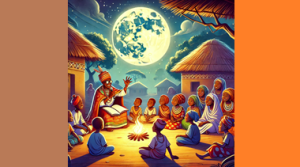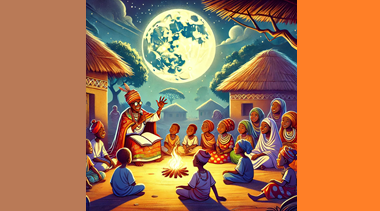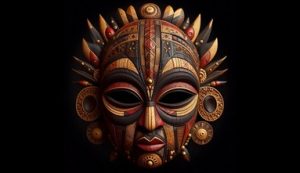Bedtime Stories in Nigeria: Past, Present, &Future Potentials
Bedtime Stories in Nigeria: Past, Present, &Future Potentials Please watch:
Bedtime stories hold a special place in cultures worldwide, and Nigeria is no exception.
While Western tales like Jack and the Beanstalk or Cinderella are familiar to many Nigerian children today, storytelling at bedtime has long been a cherished tradition in Nigerian culture.
These stories, rich with folklore and moral lessons, were an essential way of passing down knowledge, values, and heritage across generations
This article explores the origins, evolution, and potential future of bedtime storytelling in Nigeria, highlighting its cultural significance and the modern efforts to revive this age-old tradition.

The Rich Heritage of Nigerian Bedtime Stories
In Nigeria, bedtime storytelling has always been deeply rooted in cultural practices.
Long before the influence of Western fairytales, Nigerian communities embraced oral storytelling traditions during communal gatherings.
Every ethnic group had its own unique way of engaging in this practice, often under the glow of the moon.
These stories were more than entertainment—they were lessons in morality, culture, and the intricacies of human nature.
Tales by Moonlight: The Igbo Tradition
In Igbo culture, bedtime storytelling was intricately tied to Egwu Ọnwa (moonlight play). After a day’s work, communities gathered to relax under the moonlight.
While young men wrestled and maidens danced, children sat around a bonfire, listening intently as an elder narrated folktales, Akụkọ Ifọ.
These tales often featured anthropomorphic characters that captured the imagination of children:
- The cunning tortoise, always outsmarting others.
- The tyrannical lion represents unchecked power.
- The gluttonous elephant symbolizes greed.
Each story carried valuable lessons, teaching children about virtues such as honesty, bravery, and wisdom.
Adding to the allure were the songs woven into the narratives. Often rhythmic and catchy, these songs became the children’s first introduction to music and were memorized like nursery rhymes.
Bedtime Stories: Other Traditions across Nigeria
The storytelling tradition wasn’t exclusive to the Igbo people. In Yoruba culture, bedtime stories, known as Awọn Alo Ilé, were shared during Ere Osupa (moonlight play).
Similarly, in Hausa communities, these tales were called Tatsuniya. Each group used its stories to impart cultural knowledge and moral values while strengthening communal bonds.
The Gradual Decline of Bedtime Stories in Nigeria
By the mid-1990s, Nigerian bedtime stories were still a prominent part of childhood, albeit adapted to modern settings.
Stories were told not around bonfires but under the soft light of candles, lanterns, or fluorescent bulbs. The essence remained the same: to entertain, educate, and instill cultural values.
However, the early 2000s marked a noticeable decline in this tradition. Several factors contributed to this downturn:
- Economic Challenges:
As Nigeria’s economy worsened, parents became overburdened with work. Exhausted from the demands of providing for their families, many parents lacked the energy to tell bedtime stories at night. - Oral tradition vulnerabilities:
Since most Nigerian folktales were passed down orally, they risked being lost with each passing generation. The absence of written records meant that stories were often forgotten over time. - Western Influence:
The increasing influence of Western culture, particularly through books, movies, and television, made Nigerian folktales seem outdated. Children gravitated toward Western fairytales, which were perceived as more exciting or relatable.
However, during this period, the National Television Authority (NTA) attempted to preserve this tradition through the popular TV show Tales by Moonlight. Airing in the late 1990s and early 2000s, the program recreated the experience of communal storytelling.
Though the tales were told in English for broader accessibility, they remained a vital reminder of Nigeria’s storytelling heritage.
Revival and Modern Adaptations
In recent years, there has been a resurgence of interest in Nigerian folktales.
This revival can be attributed to a growing awareness of cultural preservation and the integration of traditional elements into contemporary media.
Modern Efforts to Preserve Nigerian Folktales
- Publications:
Nigerian bedtime stories are now being documented in books, making them accessible to a wider audience. Titles like Stories of Our Land by Ndidi Chiazor sit alongside Western classics in bookstores, offering parents an opportunity to introduce their children to authentic Nigerian tales. - Digital Platforms:
Websites, YouTube channels, and TikTok accounts are dedicated to reviving Nigerian folktales. These platforms feature animated stories, live readings, and discussions about the cultural significance of these tales. - Educational Initiatives:
Online courses, such as the Awon Alo Ile series on Udemy, teach Yoruba bedtime stories and their cultural contexts, ensuring that younger generations can connect with their heritage. - Art and Media:
Elements of Nigerian folktales have found their way into contemporary art forms, from Afrobeat music lyrics to Nollywood movies. Films like Nneka the Pretty Serpent incorporate traditional storytelling elements, blending modern narratives with cultural themes.
The Importance of Reviving Bedtime Stories
The benefits of bedtime stories extend beyond entertainment. According to a study published in The Guardian, storytelling plays a crucial role in children’s cognitive development.
For Nigerian children, hearing these tales in their native languages strengthens their cultural identity and fosters a sense of pride in their heritage.
Reviving bedtime stories is about more than preserving tradition—it’s about shaping a future generation that values its roots.

Conclusion: A Step Towards Rediscovery
As Nigerian bedtime stories regain their prominence, parents and guardians have an opportunity to reconnect their children with their cultural heritage.
Whether by reading books, exploring digital platforms, or sharing personal memories, the act of storytelling remains an invaluable gift.
Also, by intertwining entertainment with education, Nigerian folktales offer a unique way to nurture young minds and instill cultural pride.
While the challenges of modern life may prevent some parents from storytelling, the availability of resources ensures that children can still access this rich tradition.
Ultimately, whether through cultural tales or Western fairytales, bedtime stories serve a singular purpose: to enrich the lives of children, one story at a time.






Thank you for your sharing. I am worried that I lack creative ideas. It is your article that makes me full of hope. Thank you. But, I have a question, can you help me?
Thanks for sharing. I read many of your blog posts, cool, your blog is very good.
I don’t think the title of your article matches the content lol. Just kidding, mainly because I had some doubts after reading the article. https://www.binance.com/sl/register?ref=OMM3XK51
Hi there, for alll time i used to check weblog posts here in thhe early
hours in the daylight, since i enjoy to gain knowledge
of more and more. https://Glassiindia.Wordpress.com/
I don’t think the title of your article matches the content lol. Just kidding, mainly because I had some doubts after reading the article. https://www.binance.com/zh-TC/register?ref=DCKLL1YD